- Home
- Sue Grafton
S Is for Silence Page 3
S Is for Silence Read online
Page 3
Ahead of me, Daisy activated her turn signal and eased off the highway, taking the 135, which angled north and west. I followed. Idly I picked up the map I'd folded into thirds and laid on the passenger seat. A quick glance showed a widespread smattering of small towns, no more than dots on the landscape: Barker, Freeman, Tullis, Arnaud, Silas, and Cromwell, the latter being the largest, with a population of 6,200. I'm always curious how such communities come into existence. Time permitting, I'd make the rounds so I could see for myself.
Daisy's house was off Donovan Road to the west of the 135. She pulled into a driveway that ran between two 1970s-era frame-and-stucco houses, mirror images of each other, though hers was painted dark green and the one next door was gray. Against her house, bougainvillea grew from thick vines that climbed as far as the asphalt shingle roof in a tangle of blossoms the shape and color of cooked shrimp. I parked at the curb and got out of my car while she pulled the Honda into the garage and removed her suitcase from the trunk. I stood on the porch and watched her unlock the door.
"Let me get some windows open," she said as she went in.
I stepped in after her. The house had been closed up for days and the interior felt hot and dry. Daisy moved through the living and dining rooms to the kitchen, opening windows along the way. "The bathroom's off that hall to the right."
I said, "Thanks," and went in search of it, primarily because it gave me the opportunity to peek into other rooms. The floor plan was common to houses of this type. There was an L-shaped living-dining room combination. A galley-style kitchen ran the depth of the house on the left, and on the right, a hallway connected two small bedrooms with a bathroom in between. The place was clean but leaned toward shabby.
I closed the bathroom door and availed myself of the facilities — a polite way of saying that I peed. The tile in the bathroom was dark maroon, the counter edged with a two-inch beige bullnose. The toilet was the same deep maroon. Daisy's robe hung on the back of the door, a silky Japanese kimono, dense sky blue, with a green and orange dragon embroidered on the back. I gave her points for that one. I'd imagined something closer to a granny gown, rose-sprigged flannel, ankle-length and prim. There must be a sensual side to her that I hadn't seen.
I joined her in the kitchen. Daisy had put a kettle on the stove, flames turned up high to speed along the process. On the table, she'd set out tea bags and two heavy ceramic mugs. She said, "I'll be right back," and disappeared toward the bathroom, which allowed me the opportunity to peer out the kitchen window. I studied the neatly kept yard. The grass had been trimmed. The rose bushes were thick with blooms — pink, blush, peach, and brassy orange. Tannie had told me Daisy drank to excess, but whatever angst had been generated by her mother's disappearance, her exterior life was in order, perhaps in direct counterpoint to the emotional mess inside. While she was gone... as a courtesy... I refrained from peeking into the trash to see if she'd tossed any empty vodka bottles. The kettle began to whistle, so I turned off the burner and poured sputtering water into our cups.
When she returned she carried a manila folder that she placed on the table. She settled in her chair and put on a pair of drugstore-rack reading glasses with round metal frames. She removed a sheaf of newspaper articles, clipped together, and a page of notes, neatly printed, the letters round and regular. "These are all the newspaper accounts I could find. You don't have to read them now, but I thought they might help. And these are the names, addresses, and phone numbers of the people you might want to talk to." She pointed to the first name on the list. "Foley Sullivan's my dad."
"He now lives in Cromwell?"
She nodded. "He couldn't stay in Serena Station. I guess a few people reserved judgment, but most thought poorly of him to begin with. He'd been a drinker before she left, but he quit cold and hasn't had a drop since. This next name, Liza Clements? Her maiden name was Mellincamp. She's the babysitter who was watching me the night my mother ran off... escaped... whatever you want to call it. Liza had just turned fourteen and she lived one block over. This gal, Kathy Cramer, was her best friend — still is for that matter. Her family lived a couple of houses down — big place and nice, relative to everything else. Kathy's mother was a dreadful gossip, and it's possible Kathy picked up a few tidbits from her."
"Is the family still there?"
"The father is. Chet Cramer. Foley bought the car from his dealership. Kathy's married and she and her husband bought a place in Orcutt. Her mother died seven or eight years after Mom disappeared, and Chet married some new gal within six months."
"I bet that was a popular move." I indicated the next name on the list. "Who's this?"
"Calvin Wilcox is Violet's only brother. I think he saw her that week, so he may be able to fill in a few gaps. This guy, BW, was the bartender at the dive where my parents hung out, and these are miscellaneous customers who witnessed some of their famous public shoving matches."
"Have you talked to all these people?"
"Well, no. I mean, I've known them all for years... but I haven't asked about her."
"Don't you think you'd have better luck than I would? I'm a stranger. Why would they open up to me?"
"Because people like to talk, but a lot of stuff they might not be willing to say to me. Who wants to tell a woman how often her dad punched her mother's lights out? Or refer to the time when her mom got mad and threw a drink in some guy's face? Now and then I get wind of these things, but mostly people are falling all over themselves keeping the truth under wraps. I know they mean well, but I get weirded out by that. I hate secrets. I hate that there's all this information I'm not allowed to have. Who knows what's being said behind my back even to this day?"
"Well, I'll be giving you regular written reports, so whatever I learn you'll be hearing about."
"Good. I'm glad. About time," she said. "Oh, here. I want you to have this. Just so you'll know who you're dealing with."
She handed me a small black-and-white snapshot with a scalloped white rim and then watched over my shoulder as I studied the image. The print was four inches square and showed a woman in a floral-print sleeveless dress, smiling into the camera. Her hair, which could have been any color, was a medium-dark tone, long and gently wavy. She was small and pretty in a 1950s kind of way, more voluptuous than we'd consider stylish in this day and age. Over one arm she carried a straw tote from which a tiny fluffy pup appeared, staring at the camera with bright black eyes. "When was this taken?"
"Early June, I think."
"And the dog's name is Baby?"
"Baby, yes. A pure-bred Pomeranian everyone hated except my mom, who really doted on the little turd. Given the chance, Dad would have taken a shovel and pounded her into the ground like a tent peg. His words."
A two-by-four porch post appeared to be growing from the top of Violet's head. Behind her, on the porch rail, I could read the last two house numbers: 08. "Is this the house where you lived?"
Daisy nodded. "I'll take you by when we're over there."
"I'd like that."
* * *
We were silent on the drive to Serena Station. The sky was a flat pale blue, looking bleached by the sun. The hills rolled gently toward the horizon, the grass the color of brown sugar. Daisy's was the only car on the road. We passed abandoned oil rigs, rust-frozen and still. To my left I caught a glimpse of an old quarry and rusting railroad tracks that began and ended nowhere. On the only visibly working ranch I saw, ten head of cattle had settled on the ground like brawny cats in the slatted shade of a corral.
The town of Serena Station appeared beyond a bend in the two-lane road, with a street sign indicating that it was now called Land's End Road. The street ran in a straight line for three blocks and ended abruptly at a locked gate. Beyond the gate, the road wound up a low hill, but it didn't look like anyone had traveled it for quite some time. There were numerous cars parked in town — in driveways, along the streets, behind the general store — but nothing seemed to move except the wind. A few houses were boar
ded up, their exteriors bereft of color. In front of one, the paint on the white picket fence had been stripped to the wood, and portions of it sagged. In the small patchy lawns, what little grass remained was dry, and the ground looked hard and unforgiving. In one yard, a camper shell sat under an overhang of corrugated green plastic sheets. There were tree stumps and a tumble of firewood. What had once been the automobile-repair shop stood open to the elements. A tall, dark palm tree towered above a length of chain-link fence that extended across the rear. A stack of fifty-five-gallon oil drums had been left behind. Weeds grew in dry-looking puffs that, in time, the wind would blow free, sending them rolling down the middle of the road. A hound trotted along a side street on a doggie mission of some kind.
Behind the town the hills rose sharply, not mountains by any stretch. They were rugged, without trees, hospitable to wildlife but uninviting to hikers. I could see power lines looping from house to house, and a series of telephone poles stretched away from me like hatch marks on a pencil drawing. We parked and got out, ambling down the middle of the cracked blacktop road. There were no sidewalks and no streetlights. There was no traffic and, therefore, no traffic lights. "Not exactly bustling," I remarked. "I take it the auto-repair shop went belly-up."
"That belonged to Tannie's brother, Steve. Actually, he moved his operation into Santa Maria, figuring if someone's car broke down, the owner would never manage to get it out here. He wasn't about to offer to go get them. At the time, he only had one tow truck and that was usually out of commission."
"Not much of an advertisement for auto repair."
"Yeah, well he was bad at it anyway. Once he moved, he hired a couple of mechanics and now he's doing great."
Daisy pointed out the house where Chet Cramer lived with his current wife. "The Cramers were the only family with any sizeable income. They had the first television set anybody'd ever seen. If you played your cards right, you could watch Howdy Doody or Your Show of Shows. Liza took me over there once, but Kathy didn't like me so I wasn't invited back."
The Cramers' house was the only two-story structure I'd seen, an old-fashioned farmhouse with a wide wooden porch. I'd stuck a pack of index cards in my jacket pocket, and I used one now to make a crude map of the town. I'd be talking to a number of current and former residents, and I thought it would help to have a sense of where they'd lived relative to one another.
Daisy paused in front of a pale green stucco house with a flat roofline. Up came the hand so she could gnaw on herself. A short walkway lead from the street to the walk-out porch. A chain-link fence surrounded the property, with a sign hanging from the open gate that read NO TRESPASS. The yard was dead. Raw plywood sheets had been nailed over the windows. The front door had been lifted from its hinges and left leaning against the outside wall. The house number was 3908.
"That's where you lived. I recognize the porch rail from the photograph."
"Yep. You want to come in?"
"We're not trespassing?"
"Not now. I bought it. Don't ask me why. My parents rented from a guy named Tom Padgett, who sold it to me. You'll see his name on the list. He was in the bar on a couple of occasions when the two of them pitched a fit. Daddy worked construction so sometimes we had money and sometimes not. If he had it, he'd spend it, and if he didn't have it, too bad. Owing people money never bothered him. Bad weather he'd be out of a job or else he'd get fired for showing up drunk. He wasn't exactly a deadbeat, but he operated with a similar mentality. He'd take care of the bills if he was in the mood, but you couldn't count on that. Padgett was forever pounding on him for the rent because Daddy tended to pay late, if he paid at all. We'd be threatened with eviction, and when he finally coughed up the rent, it was always with the attitude that he was being abused."
I followed her through the gate. I knew she must have been back a hundred times, but looking for what? An explanation, a clue, an answer to the questions that were plaguing her?
Inside, the layout was elementary. Living room with a dining cove, a kitchen with just enough room for a table and chairs, though those were long since gone. The kitchen appliances had been removed, pipes and wires sticking out of the wall. Blocks of relatively clean linoleum indicated where the stove and refrigerator had once sat. The sink was still there, along with the chipped Formica counters with metal rims. Cabinet doors stood open, revealing the empty shelves where paper was curling up from the corners. Without even meaning to, I moved forward and closed one of the cabinet doors. "Sorry. Things like that bug me."
"I'm the same way," Daisy said. "You wait. Leave the room and come back and the door will be open again. Almost enough to make you wonder about ghosts."
"You're not tempted to fix it up?"
"Maybe one day, though I can't imagine ever living here again. I like the house I'm in."
"So which bedroom was yours?"
"In here."
The room was barely nine feet by twelve, painted an unpleasant shade of pink that I supposed was meant to be girlish.
"My bed was in this corner. Chest of drawers there. Armoire. Toy box. Little table and two chairs." She leaned against the wall and surveyed the space. "I felt so lucky to have a room of my own. I didn't know from tacky. Most of the people we knew were as bad off as we were. Or that's what I realize now."
She moved from her room to the second bedroom and paused in the door. This one was painted lavender with a wallpaper border of violets along the low ceiling line. I backtracked three steps and checked the bathroom, where the sink and bathtub were still anchored in place. The toilet had been removed and a rag was stuffed in the hole, which still emitted the spoiled-egg smell of flushes gone by. This was possibly the most depressing house I'd ever been in.
She moved in behind me, perhaps seeing the house as I did. "Believe it or not, my mother did what she could to pretty things up. Lace curtains for the living room, throw rugs, doilies for the furniture — stuff like that. One of the last fights I remember, my dad went berserk and tore down one of her precious lace panels. I don't think he could have done anything worse. That's how they were, always going to extremes, pushing each other over the edge. She tore down the rest, ripped them off the rods and threw them in the trash. I could hear her screaming she was finished. Done. She said he destroyed everything beautiful she tried to do and she hated him for that. Blah, blah, blah. That was a couple of days before she left."
"Did it scare you? The fights?"
"Sometimes. Mostly I thought that's just how parents behaved," she said. "Anyway, the upshot is I'm a chronic insomniac. Shrinks have a field day with that. The only time I remember sleeping well was when I was a little kid and my parents went out. It must have been the only time I felt safe, because Liza was in charge and I knew I could trust her to take care of me."
"You remember anything else from those last few days?"
"A bubble bath. It's the little things that get you. I was sitting in the tub and she was on her way out. She stuck her head in the door... that little yappy dog in her arms... and she blew me a kiss. If I'd known it was the last one I'd ever get, I'd have made her come back and kiss me for real."
Chapter 4
* * *
Daisy took an alternate route on our return to Santa Maria, swinging north in a wide loop that, according to the map, encompassed the townships of Beatty and Poe. In point of fact, I didn't see either one. I squinted, saying, "Where's Poe? The map says it's right here close to a little town called Beatty."
"I think those are company names. Poe, I don't know about, but there's a Beatty Oil and Natural Gas. If there were ever towns in those spots, they might've left the names on the map so the area won't seem so desolate."
The surrounding countryside was flat, entirely given over to agriculture: fields of lettuce, sugar beets, and beans as far as the eye could see. The air smelled of celery. Bright blue port-o-potties stood like sentinels along the road. Cars were parked along the berm adjacent to some fields. Wooden crates were stacked high on flatbed tru
cks, and migrant farmworkers bent above the rows, harvesting a crop I didn't recognize on sight, flying by as we were at sixty miles an hour. The road made a wide curve north. Oil rigs dotted the land and in one section, there was a small refinery that threw off an odor reminiscent of burning tires. In sections, I could see a line of stationary boxcars that must have stretched for a quarter of a mile.
I looked past her through the driver's-side window. Tucked in a stand of pines, a grand old stone-and-stucco house sat close to the road, abandoned to all appearances. The architecture had elements of English Tudor with a touch of Swiss chalet thrown in, the whole of it incongruous in the midst of tilled and untilled fields. The second story was half-timbered with three gables punctuating the roofline. "What the heck is that?"
Daisy slowed. "That's why we came this way. Tannie and her brother, Steve, inherited the house and three hundred acres of farmland, some of which they lease out."
Two massive stone chimneys bracketed the house on each end. The narrow third-story windows suggested rooms reserved for household servants. A magnificent oak had been planted at one corner of the house, probably ninety years before, and now overshadowed the entrance. Across the road, there was empty acreage.
The yard was completely overgrown. Weeds had proliferated and once decorative shrubs were close to eight feet high, obscuring the ground-floor windows. Where there had been a gracious approach, defined by boxwoods on both sides of a wide brick path, the passage was now close to impenetrable. Someone was using a small tractor to clear the overgrowth near the road, piling it in a mound. The brush closer to the house would probably have to be hacked away by hand. Daunting, I thought.

 S Is for Silence
S Is for Silence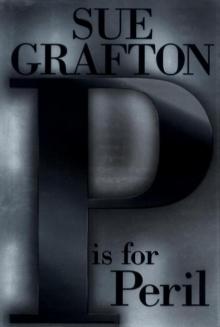 P Is for Peril
P Is for Peril R Is for Ricochet
R Is for Ricochet J Is for Judgment
J Is for Judgment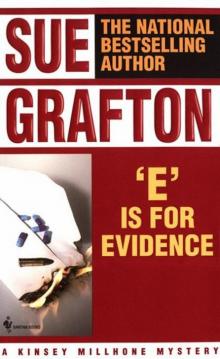 E Is for Evidence
E Is for Evidence T Is for Trespass
T Is for Trespass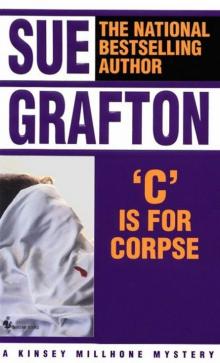 C Is for Corpse
C Is for Corpse U Is for Undertow
U Is for Undertow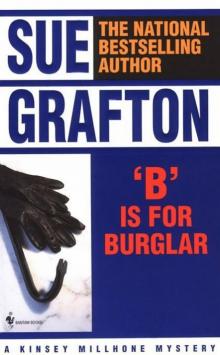 B Is for Burglar
B Is for Burglar Four Sue Grafton Novels
Four Sue Grafton Novels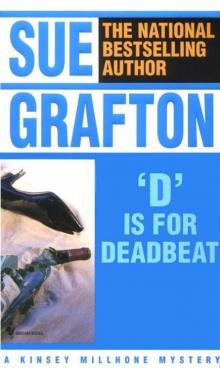 D Is for Deadbeat
D Is for Deadbeat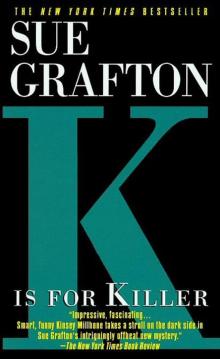 K Is for Killer
K Is for Killer I Is for Innocent
I Is for Innocent A Is for Alibi
A Is for Alibi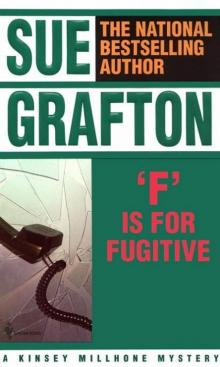 F Is for Fugitive
F Is for Fugitive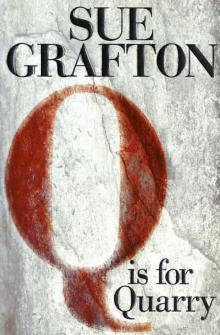 Q Is for Quarry
Q Is for Quarry W Is for Wasted
W Is for Wasted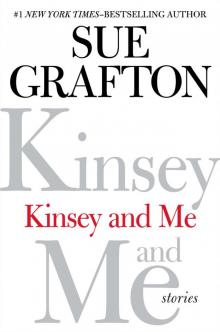 Kinsey and Me: Stories
Kinsey and Me: Stories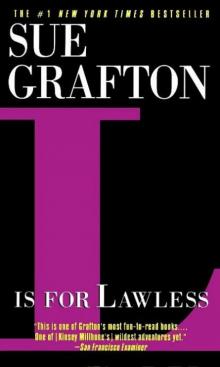 L Is for Lawless
L Is for Lawless Y Is for Yesterday
Y Is for Yesterday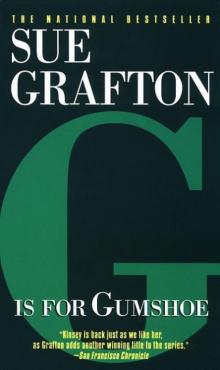 G Is for Gumshoe
G Is for Gumshoe O Is for Outlaw
O Is for Outlaw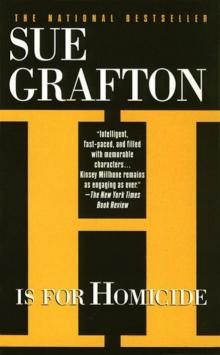 H Is for Homicide
H Is for Homicide X
X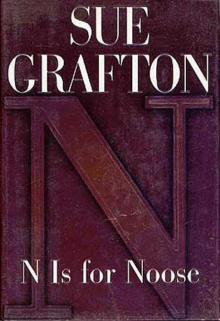 N Is for Noose
N Is for Noose Three Complete Novels: A Is for Alibi / B Is for Burglar / C Is for Corpse
Three Complete Novels: A Is for Alibi / B Is for Burglar / C Is for Corpse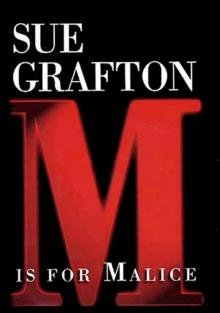 M Is for Malice
M Is for Malice I is for INNOCENT
I is for INNOCENT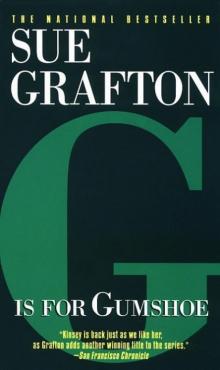 G is for GUMSHOE
G is for GUMSHOE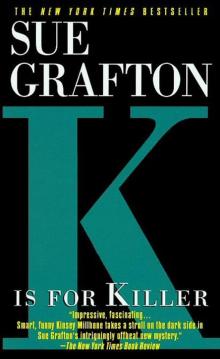 K is for KILLER
K is for KILLER S is for SILENCE
S is for SILENCE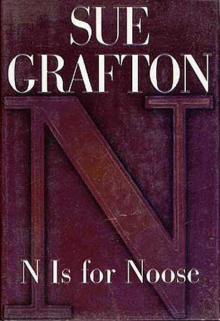 N is for NOOSE
N is for NOOSE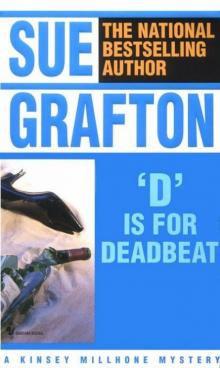 D is for DEADBEAT
D is for DEADBEAT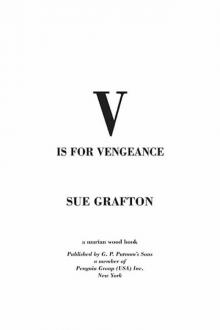 V is for Vengeance
V is for Vengeance U is for Undertow
U is for Undertow W Is for Wasted km-23
W Is for Wasted km-23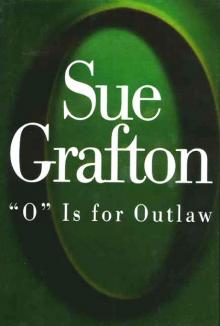 O is for OUTLAW
O is for OUTLAW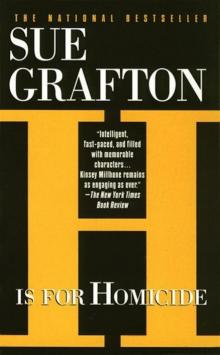 H is for HOMICIDE
H is for HOMICIDE Sue Grafton Novel Collection
Sue Grafton Novel Collection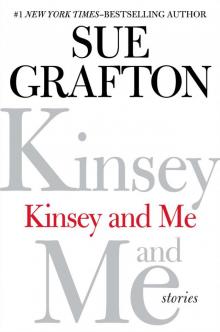 Kinsey and Me
Kinsey and Me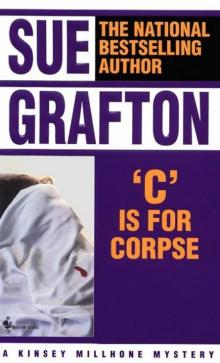 C is for CORPSE
C is for CORPSE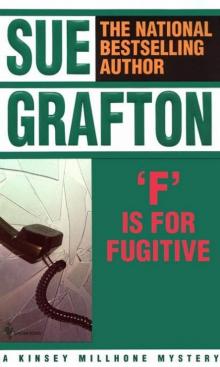 F is for FUGITIVE
F is for FUGITIVE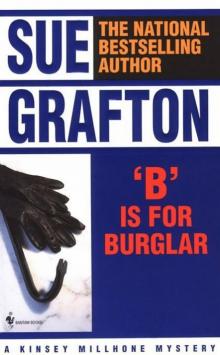 B is for BURGLAR
B is for BURGLAR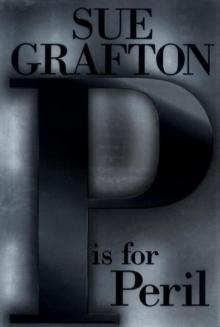 P is for PERIL
P is for PERIL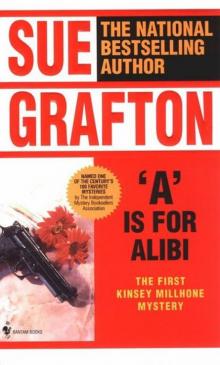 A is for ALIBI
A is for ALIBI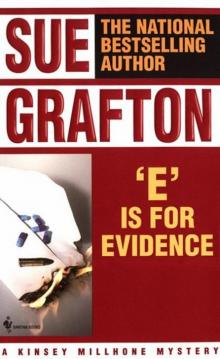 E is for EVIDENCE
E is for EVIDENCE J is for JUDGMENT
J is for JUDGMENT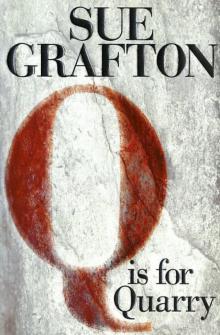 Q is for QUARRY
Q is for QUARRY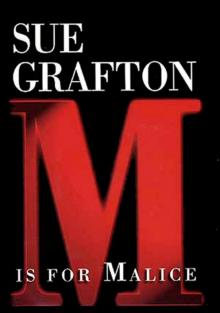 M is for MALICE
M is for MALICE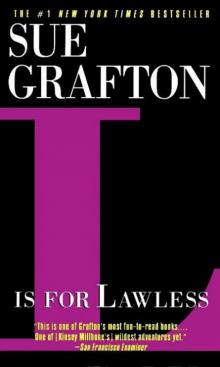 L is for LAWLESS
L is for LAWLESS